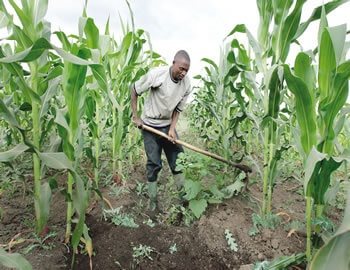Professor of Agricultural Economics, Department of Agricultural Economics, Federal University of Technology Owerri (FUTO), Julius Sunday Orebiyi, has said that development of agriculture in Nigeria has not been able to keep pace with the desired expectations despite several agricultural policies and programmes put in place by the past governments.
He made this observation while delivering 29th Inaugural Lecture at FUTO entitled “Aricultural Credit: A policy catalyst needed for poverty reduction and rural agriculture transformation in Nigeria”
Professor Orebiyi explained that even though the Nigeria agricultural policy had always provided, among others, for adequate financing of the agricultural sector development, it was very sad to observe that government expenditure on agriculture had been shown not to be substantial enough to meet the objective of policies.
This, he said, accounted for why Nigeria could not depend on herself to supply the large fraction of her food needs for herself sufficiently.
Said he: “Since the Nigerian economy is dependent on petroleum as a source of its revenue and the chief export driving the wheels of the economy, poor financing of the agricultural sector continued to lead to increased reduction in supply”
According to him, this, in turn, continues to trigger off inflation in the country and its attendant consequences of fall in the value of Naira and price instability which is even more pronounced today than any other time in the past as far as the history of this country is concerned.
He pointed out that in spite of these laudable objectives, the development of the rural agricultural sector where the buck of the agricultural production takes place had been slow and consequently, its impact on the economic growth and development had been minimal without much appreciative effects on the economic well-being of the rural dwellers except “increased in their poverty level”.
He urged the country’s policy planners to formulate agricultural financing policies that would target some important agricultural crops aimed at improving output which would be used as raw materials for industries.
This, according to him, would lead to reduction of import, increase earnings, conserve the country’s foreign exchange, stimulate economic growth and generate employment
WATCH TOP VIDEOS FROM NIGERIAN TRIBUNE TV
- Relationship Hangout: Public vs Private Proposals – Which Truly Wins in Love?
- “No” Is a Complete Sentence: Why You Should Stop Feeling Guilty
- Relationship Hangout: Friendship Talk 2025 – How to Be a Good Friend & Big Questions on Friendship
- Police Overpower Armed Robbers in Ibadan After Fierce Struggle






